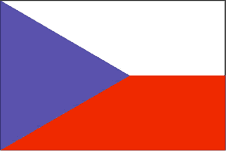|
|
Czech Republic
|
|
Czech Republic is a country in central Europe that became independent on Jan. 1, 1993. It is bordered by Poland to the north, Slovakia to the east, Austria to the south, and Germany to the west.
Prague is the capital and largest city. From 1918 until Dec. 31, 1992, the area that is now the Czech Republic was united with Slovakia in a larger nation called Czechoslovakia.
A Short Background
After World War II, Czechoslovakia fell within the Soviet sphere of influence. In 1968, an invasion by Warsaw Pact troops ended the efforts of the country's leaders to liberalize party rule and create "socialism with a human face.
Anti-Soviet demonstrations the following year ushered in a period of harsh repression. With the collapse of Soviet authority in 1989, Czechoslovakia regained its freedom through a peaceful "Velvet Revolution." On 1 January 1993, the country underwent a "velvet divorce" into its two national components, the Czech Republic and Slovakia.
Now a member of NATO, the Czech Republic has moved toward integration in world markets, a development that poses both opportunities and risks.
Population: 10,264,212 (July 2001 est.)
Languages: Czech
Nationality: noun: Czech(s)
adjective: Czech
Ethnic groups: Czech 81.2%, Moravian 13.2%, Slovak 3.1%, Polish 0.6%, German 0.5%, Silesian 0.4%, Roma 0.3%,
Hungarian 0.2%, other 0.5% (1991)
Religions: atheist 39.8%, Roman Catholic 39.2%, Protestant 4.6%, Orthodox 3%, other 13.4%
Languages: Czech
Currency: Czech koruna (CZK)
Currency code: CZK; 1 EURO to Czech Koruna: 32,683 April 2004) More Informations:
Have a look at this pdf-file for information about the dance Doudlebska Polka
To read the file you need the free software Adobe Reader from Adobe or another pdf-viewer.
The Adobe Reader you can find on the homepage from Adobe under Support - Downloads.


